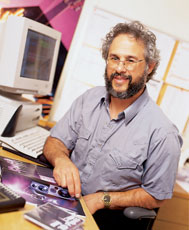|
|
It's No Joke |
April 2000 |
|
Once upon a time, Opcode was a hotbed of invention. Sequencer was an early Mac favorite, and Vision's graphical user interface quickly earned the program a large, loyal following. Standard MIDI Files, MIDI Time Code, and the first digital audio sequencer (Studio Vision) were all developed at Opcode by Dave Oppenheim, Ray Spears, and friends. Galaxy Plus Editors was not the first MIDI patch editor/librarian, but it did introduce refinements and innovations. IRCAM created the Max MIDI programming environment, but Opcode's David Zicarelli developed it into a commercial product.
Opcode Systems' apparent demise (or at least, its current MIA status) touches much of the Mac-based music community. Many Mac musicians are especially concerned about the freeware Open Music System (OMS) system extension, which provides a common timing reference for MIDI applications and routes MIDI data between compatible applications and MIDI interfaces. OMS is a de facto industry standard: a wide variety of Mac software developers have adopted OMS, and some Mac applications cannot run properly without it.
Opcode was in trouble long before Gibson Musical Instruments purchased it. The Gibson deal promised to provide cash that would enable Opcode to pull itself back together, but recovery was likely to be slow. Furthermore, Gibson's previous attempts to revive troubled high-tech companies, such as the once-proud Oberheim, had been unimpressive. Indeed, within a relatively short time, the Gibson-Opcode acquisition deteriorated into a grim nightmare of litigation that froze the Opcode product line. Meanwhile, competing products were aggressively on the move.
Today, you can still buy Vision DSP and Studio Vision online (www.opcode.com), but the engineers who created them have moved on, and development appears to have ended. Opcode's Web site makes no mention of Galaxy Plus Editors; presumably it is history. Fortunately, there are excellent alternatives to these programs.
Max, on the other hand, is unique, and it is a must-have for a small group of hard-core electronic musicians. Because demand is low, Max is unlikely to enrich Gibson, and I would love to see Gibson sell the program to Zicarelli (now the reigning guru at Cycling '74), who almost certainly would develop it further.
OMS presents a thornier problem. It is critical to many MIDI studios, but it generates no cash. And OMS 2.3.8 is written in old 680x0 code, not native PowerPC code. It's unstable under Mac OS 9 and will surely be incompatible with Mac OS X. As an industry standard, it must be rewritten or replaced by someone who has the full confidence of Mac software developers. That's not going to be Gibson. OMS is dead unless Gibson either open-sources it for public development or transfers it to someone who can solve both the technical and the political problems.
Fortunately, OMS might not be an issue for long because original OMS author Doug Wyatt recently joined Apple Computer. Apple won't comment on Wyatt's duties, but the grapevine has it that he's going to create a modern MIDI solution for Mac OS X. I hope he'll create a native PowerPC solution for OS 9, too.
If Apple replaces OMS and Max finds a proper home, Mac users can settle back and calmly watch Opcode reemerge or rest in peace. And that's no April Fools' joke. |
